PRELIMINARY OBSERVATION SUMMARY OF 25 OCTOBER 2015 LOCAL ELECTIONS BY OPORA.
FINAL SUMMARY OF ELECTION CAMPAIGN ON THE EVE OF ELECTION DAY
Table of contents
PRELIMINARY OBSERVATION SUMMARY OF 25 OCTOBER 2015 LOCAL ELECTIONS BY OPORA
PRE-ELECTION ACTIVENESS OF PARTIES IN LOCAL ELECTIONS
ELECTION COMMISSIONS PERFORMANCE AT LOCAL ELECTIONS
Central Election Commission Performance
Territorial Election Commissions’ Performance
Precinct Election Commissions Performance
VIOLATIONS OF ELECTION LEGISLATION
Instances of Illegal Campaigning
Instances of Administrative Resource Abuse
Â
Â
INTRODUCTION
Civil Network OPORA conducts citizen observation of local elections in Ukraine, scheduled for 25 October 2015. Civic monitoring conducted by OPORA - is a type of network activity, aimed at impartial assessment of the preparation and conduct of elections, as well as preventing electoral violations through comprehensive civic action. 144 long-term observers were deployed to all Ukrainian regions on 5 September, and 3000 short-term observers will join them on the election day.
PRELIMINARY OBSERVATION SUMMARY OF 25 OCTOBER 2015 LOCAL ELECTIONS BY OPORA
According to the results of independent observation of local elections in Ukraine from the official start of campaign to 23 October 2015, OPORA has the following preliminary summary:
- Ukrainian government haven't secured stability of the election legislation in the new Law on Local Elections and, therefore, caused significant complications in the election process. On the one hand, the voters receive insufficient information about peculiarities of the election system which is applied for the first time; On the other hand, election commission members, local party cells and candidate didn't have a minimum time to learn about innovation of electoral legislation;
- New Law of Ukraine on Local Elections has a number of drawbacks and inconsistencies what can be explained by the fact that the standards for preparation of such important law were not followed.
- OPORA has noticed numerous incidents when Law of Ukraine on Local Elections was unequally applied in similar situations. Such incidents, caused by ambiguous law regulations and procedures, hindered adherence to election campaign standards;
- Besides that, the CEC had to provide explanations of election law regulations, sometimes considerably specifying the procedure. We specifically mean CEC's explanations of gender quota requirements and the procedure of acquiring a mandate by first candidates in electoral lists of local party cells if they overcome the election threshold.
- Â Despite OPORA welcomes efforts of the CEC, resulting from poorly thought-out regulations adopted by the Parliament, we would like to emphasize that this fact undermines public trust to the state and its ability to efficiently secure high-quality election process. Besides that, the fact that the CEC and judicial bodies acknowledged some regulations of the Law on Local Elections as declarative can affect the image of election process in citizen's eyes. Complications that territorial election commissions faced in regard to adherence to new legislation were sometimes directly resolved by the CEC. However, if the CEC directly resolves many electoral disputes and conflicts, political manipulations may arise concerning centralized influence on the election campaign.
- As long as the Law doesn't establish any efficient restrictions for early campaigning, many candidates had started campaigning yet before they were officially registered. Thus, such campaign expenses couldn't have been controlled as long as the Law doesn't provide any determination for such campaigning before official registration of candidates and, therefore, it's a mere unfair scheme used to ripe benefits. According to information gathered by the OPORA, electoral fund managers of local party cells and candidates have often failed to submit interim financial reports within time constraints established by the Law. Thus, the voters didn't receive the corresponding information about candidates and it's impossible to secure proper oversight of election campaigning financing.
- According to OPORA's estimations, violations of campaigning rules and indirect bribery of voters were the most widespread in Ukraine. 395 of 668 violations detected by OPORA concerned violation of campaigning rules, and 193 – indirect voter bribery. Campaigning rules were usually violated when production and dissemination of campaign materials was financed not from the election fund. As for the indirect bribery, the most widespread was arrangement of surrounding areas and street infrastructure, construction of playgrounds and sports grounds, distribution of product sets and presents, free medical and legal services;
- Â However, OPORA would like to note that law-enforcement bodies more actively respond to election law violations. Besides that, we have managed to adjust cooperation with territorial departments of the MIA of Ukraine in every Ukrainian region. With the exception of some incidents, bodies of internal affairs have properly documented violations detected by OPORA's observers, as well as registered statements and notices about violations, and initiated the corresponding criminal proceedings. However, the cases when bodies of internal affairs responded to electoral violations by themselves occurred quite rarely.
- Candidate registration process was accompanied by conflicts and controversies resulting from unequal application of the Law on Local Elections by territorial election commissions as well as political motives of the certain election commissions. Some incidents when candidates were refused in registration could be classified as obstruction to the free exercise of a passive election rights. Thus, it should have been protected by both courts and direct interference of the CEC. However, the voters have received a competitive list of candidates, which wasn't limited by unjustified decisions or restrictions of the state. As a result of numerous appeals against TEC decisions concerning rejection of candidates, the time constraints for candidate registration were not observed in many territorial communities and regions, what have negatively influenced the following stages of the election process.
- According to OPORA's data, the candidates holding offices at state executive bodies didn't use the administrative resource at a wide scale and didn't use access to the power for their election benefit systematically. However, candidates holding offices at local self-government bodies were quite often using their authority and local community resources for the benefit of their election campaigns.
- Election campaign was quite competitive, there were no unsubstantiated legal restrictions of state interference. According to OPORA's estimations, 12 political parties ahve organized nationwide election campaigns: Petro Poroshenko Bloc 'Solidarity', AUU Batkivshchyna, UKROP, Nash Krai, Opposition Bloc, Samopomich Union, Revival party, AUU Svoboda, Radical Party of Oleh Liashko, Agrarian Party of Ukraine, Narodnyi Kontrol (People's Oversight) Civic Movement party and Ridne Misto party. However, there were a lot of local parties which were active only in some territorial communities despite their nationwide status.
- According to OPORA's estimations, expenses of political parties and candidates on election campaign were quite high as they used the most expensive types of advertising (outdoor and media advertising). As for the drawbacks, there were no wide scale open discussions or debates between candidates dedicated to prospects of local development.
- Besides that, there were many pre-electoral promises which do not belong to authority of local self-government bodies. This may cause the certain difficulties in citizen oversight of the efficiency of elected local self-government bodies. Voter bribery and other violations, for their part, may affect free voting process;
- If take district election commissions in early parliamentary elections, nominating entities have managed to secure stable membership of territorial election commissions in these local elections. However, local party cells and candidates didn't use a opportunity to create precinct election commissions in full capacity, as long as they were formed in minimal membership. Thus, if PEC members have significant load on the election day, the certain issues may appear with implementation of electoral procedures;
- It should be mentioned that a lot of territorial election commissions failed to produce ballot papers within time limits established by the Law, as we as other related procedures. Errors and inaccuracies in text of ballot papers resulted in additional expenses on production of new ballots.
- Taking into consideration the previous reporting period, OPORA considers territorial communities of Dnipropetrovsk, Kharkiv, Cherkasy, Odesa, Mariupol, and Krasnoarmiisk (Donetsk obl.) and Lysychansk (Luhansk obl.) as problematic. There are serious problems in these regions in regard to securing effective work of election commissions, their political impartiality, risks of administrative resource abuses on the election day and after election precincts are closed. There are also many incidents related to indirect voter bribery.” The expert has stated that OPORA considers Ternopil (Ternopil obl.) and Poltava (Poltava obl.) as potentially problematic cities, due to organizational issues and political factors influencing the production of ballot papers.
PRE-ELECTION ACTIVENESS OF PARTIES IN LOCAL ELECTIONS
OPORA has analyzed the campaign efforts of all parties that are electoral subjects, and determined which of them organized the most wide-scale and intensive election campaigns as of 20 October. The scale of campaigning and number of oblasts covered by parties were taken into consideration. Besides that, we paid attention to various forms of campaigning used systematically and simultaneously.
Thus, according to a comprehensive monitoring campaign conducted by OPORA, there are 12 parties which are more active than the other and engage the voters in more than two oblasts of Ukraine as of the end of October. Petro Poroshenko Bloc is the most active party in local election campaign. The other two parties in top three of leaders: AUU Batkivshchyna, Ukrainian Union of Patriots – UKROP. As for the other parties which were campaigning quite actively: Nash Krai, Opposition Bloc, Samopomich Union, Revival party, AUU Svoboda, Radical Party of Oleh Liashko, Agrarian Party of Ukraine, Narodnyi Kontrol (People's Oversight) Civic Movement party and Ridne Misto party. All these parties actively use various campaigning forms – outdoor, media, street and direct engagement. Although 25 parties are campaigning quite actively, most of them focus only in the certain regions or administrative centers (coties of oblast or raion significance).Â
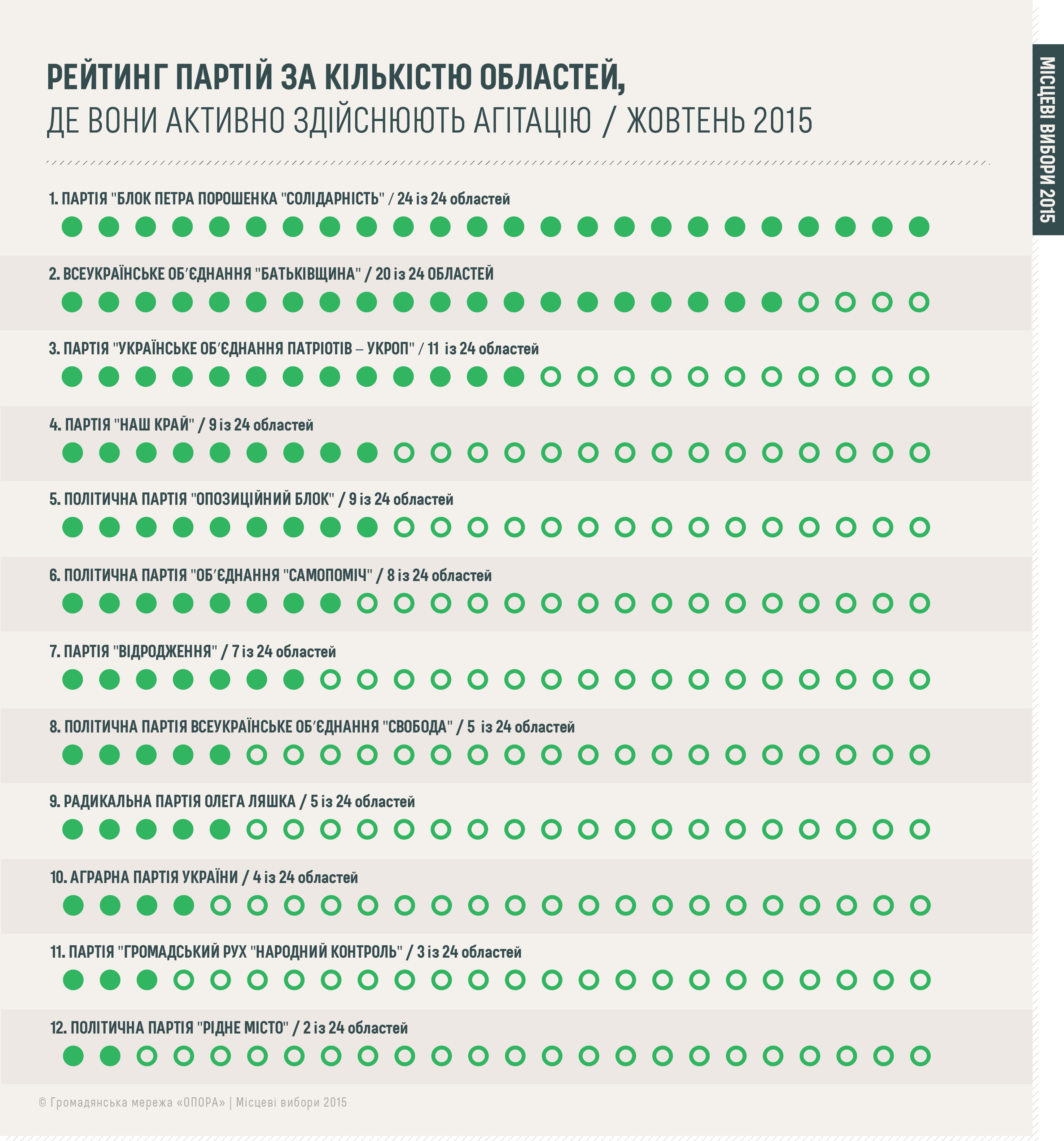
Thus, we've noticed that the Trust Deeds party was actively campaigning only in Odesa oblast, the United Centre and KMKS Party of Hungarians of Ukraine– only in Zakarpattia oblast. Civic Position party is the most active in Lviv city, New Faces party – in Kyiv oblast, For Real Deeds party – in Khmelnytsk oblast, Party of Volunteers of Ukraine – in Kharkiv oblast, VOLIA party – in Ivano-Frankivsk oblast, AUTOMAIDAN party – in Chernivtsi oblast, Party of Free Democrats and AUU Cherkashchany – in Cherkasy oblast, Sovist Ukrainy – in Poltava oblast.
Table. Rating of top active parties in local elections in Ukraine (as of 20 October 2015)
| Rating place | Party that is an electoral subject |
| 1 | Petro Poroshenko Bloc 'Solidarity' party |
| 2 | The All-Ukrainian Union Batkivshchyna political party |
| 3 | Ukrainian Union of Patriots – UKROP political party |
| 4 | Our Ukraine political party |
| 5 | Opposition Block political party |
| 6 | Samopomich Union political party |
| 7 | Vidrodzhennia Party |
| 8 | All-Ukrainian Union Svoboda political party |
| 9 | The Radical Party of Oleh Liashko |
| 10 | Agrarian Party of Ukraine |
| 11 | Narodnyi Kontrol ('People's Oversight') Civic Movement political party |
| 12 | Ridne Misto political party |
OPORA has also analyzed which parties conduct nationwide election campaigns in more than a third part of Ukrainian oblasts. Thus, there are 7 such parties: Petro Poroshenko Bloc 'Solidarity' is actively campaigning in 24 oblasts, AUU Batkivshchyna – in 20 oblasts, UKROP party – in 11 oblasts, Nash Krai and Opposition Bloc – in 9 oblasts, Samopomich Union – in 8 oblasts, and Revival party – in 7 oblasts.
Besides that, OPORA's observers have identified parties which have the highest quantity of campaign materials, public events, and appear the most often in the media (as of the middle of October). In fact, all these parties have started campaigning long before they were officially registered and became electoral subjects. Thus, they all received non-competitive advantages over other electoral contestants.
Table. Leaders in election campaign efforts per oblasts (as of 20 October 2015).
| Oblasts | Parties |
| Vinnytsia | Petro Poroshenko Bloc 'Solidarity' party |
| Volyn | Petro Poroshenko Bloc 'Solidarity' party |
| Dnipropetrovsk | Petro Poroshenko Bloc 'Solidarity' party |
| Donetsk | Our Ukraine political party |
| Zhytomyr | The All-Ukrainian Union Batkivshchyna political party |
| Zakarpattia | United Centre political party |
| Zaporizhia | Opposition Block political party |
| Ivano-Frankivsk | Petro Poroshenko Bloc 'Solidarity' party |
| Kyiv | Petro Poroshenko Bloc 'Solidarity' party |
| Kirovohrad | Petro Poroshenko Bloc 'Solidarity' party |
| Luhansk | Opposition Block political party |
| Lviv | Narodnyi Kontrol ('People's Oversight') Civic Movement political party |
| Mykolaiv | Our Ukraine political party |
| Odesa | Opposition Block political party |
| Poltava | Petro Poroshenko Bloc 'Solidarity' party |
| Rivne | The All-Ukrainian Union Batkivshchyna political party |
| Sumy | Petro Poroshenko Bloc 'Solidarity' party |
| Ternopil | Petro Poroshenko Bloc 'Solidarity' party |
| Kharkiv | Vidrodzhennia Party |
| Kherson | Petro Poroshenko Bloc 'Solidarity' party |
| Khmelnytskyi | For Real Deeds political party |
| Cherkasy | Petro Poroshenko Bloc 'Solidarity' party |
| Chernivtsi | Ridne Misto political party |
| Chernihiv | Our Ukraine political party |
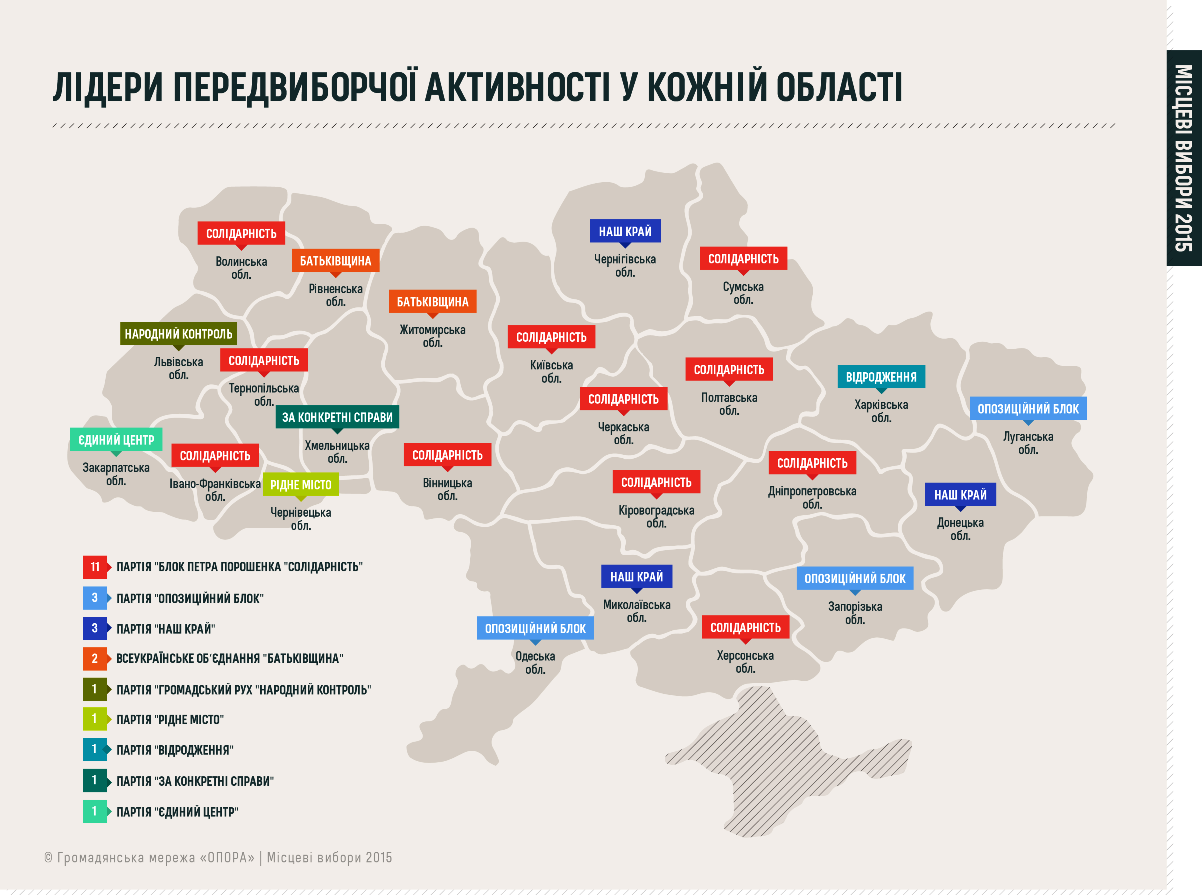
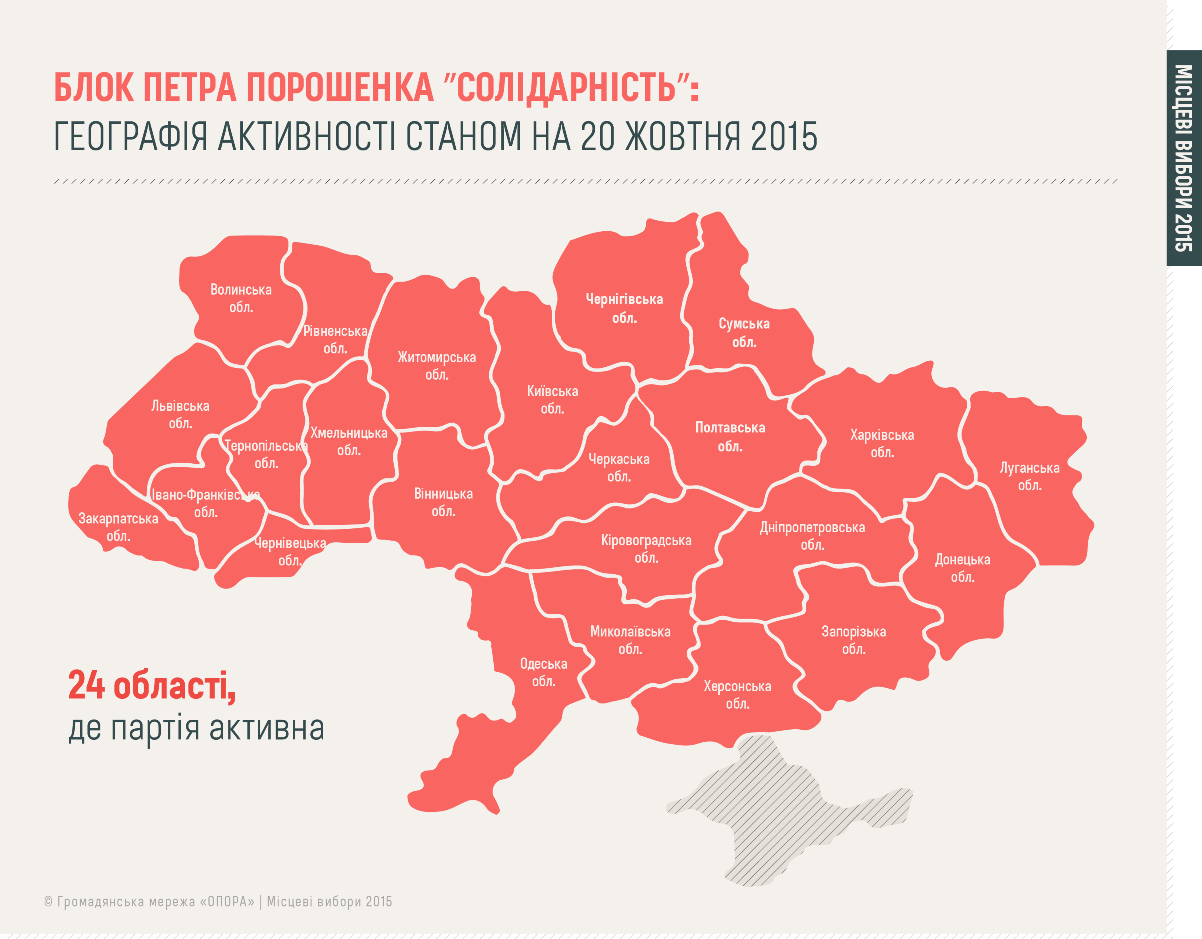
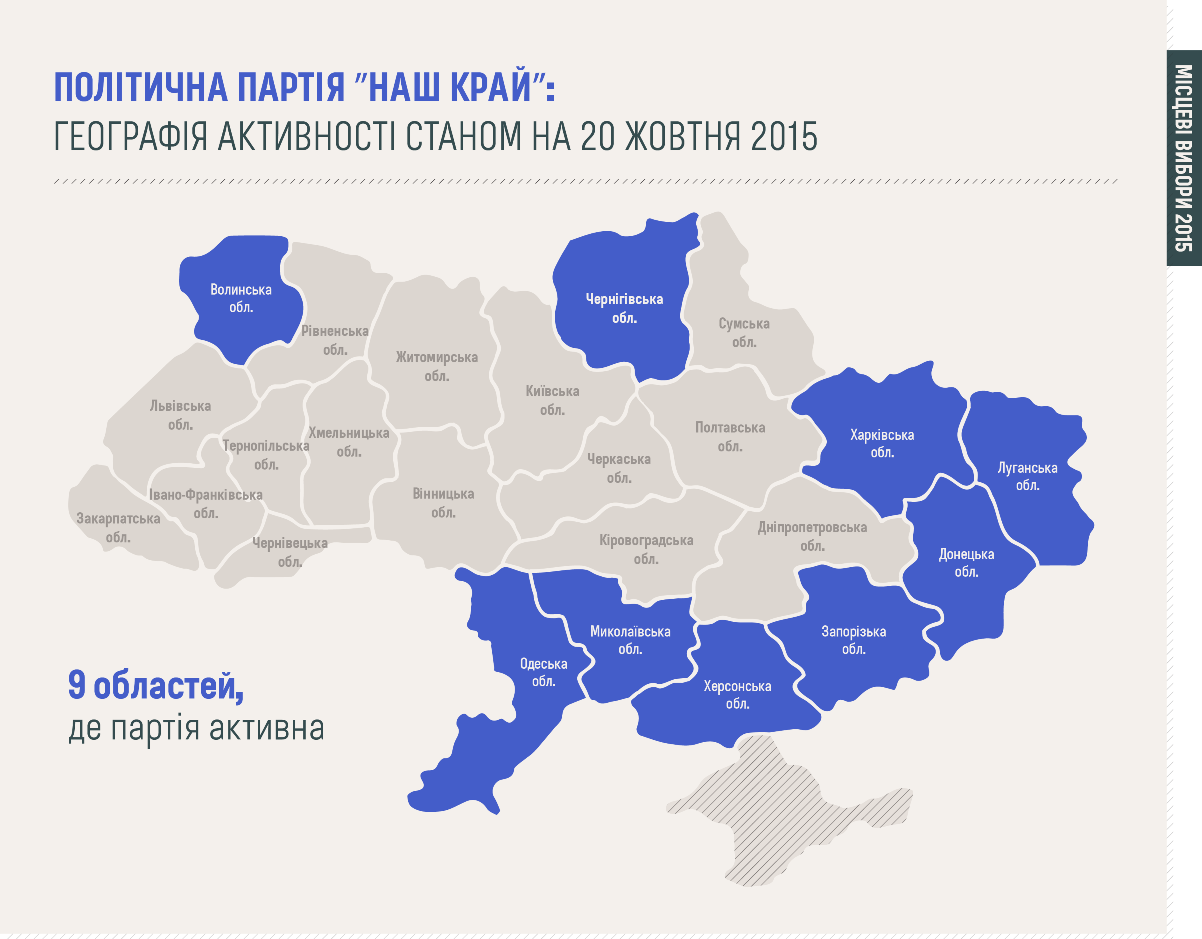
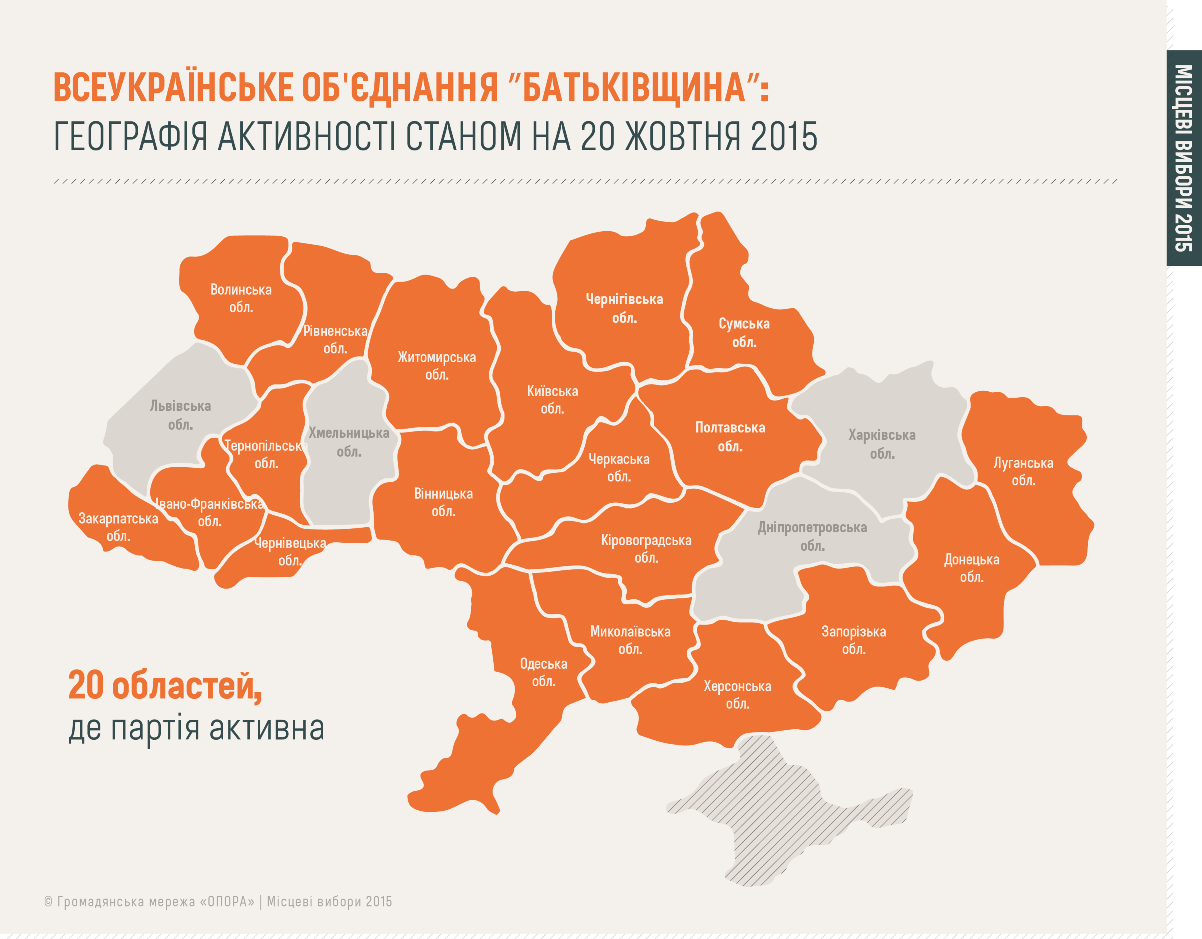
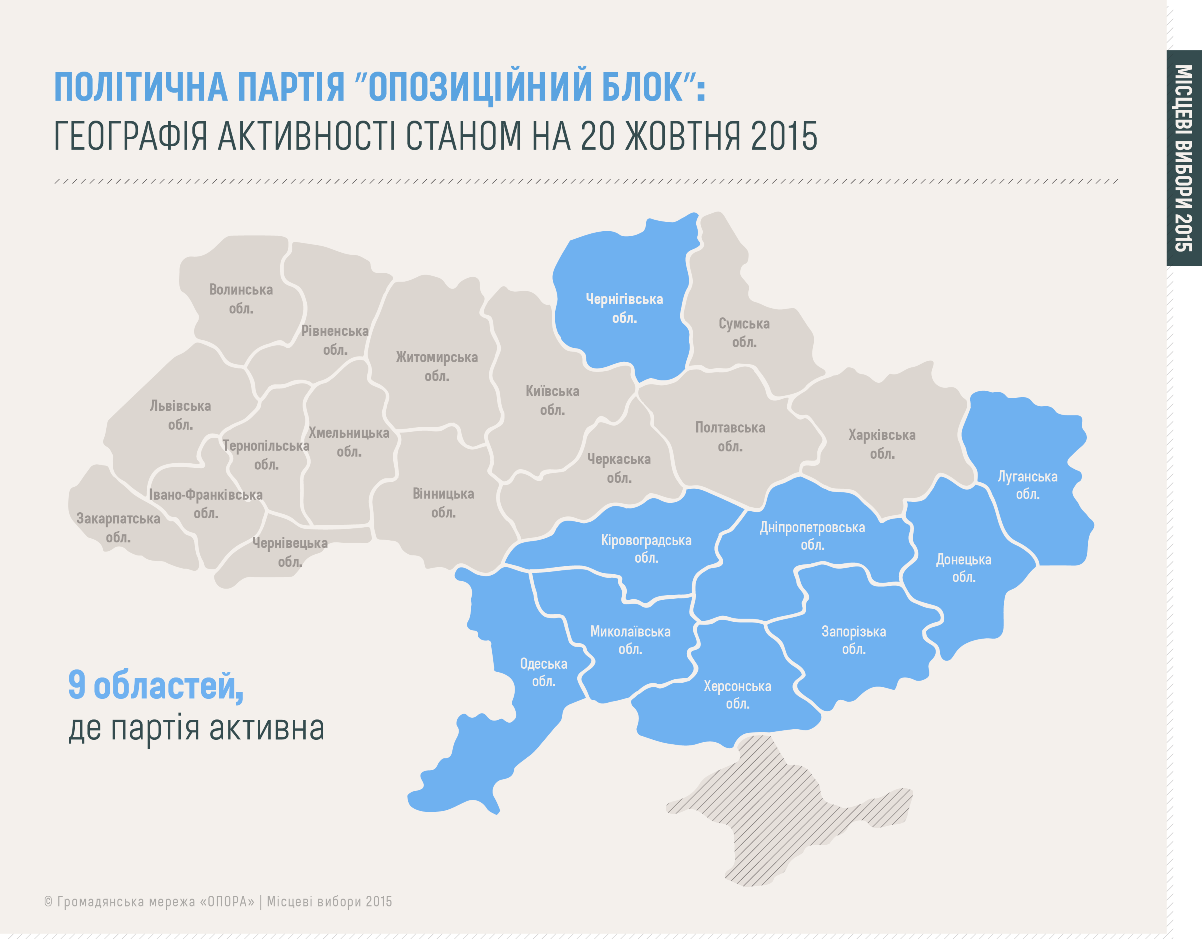
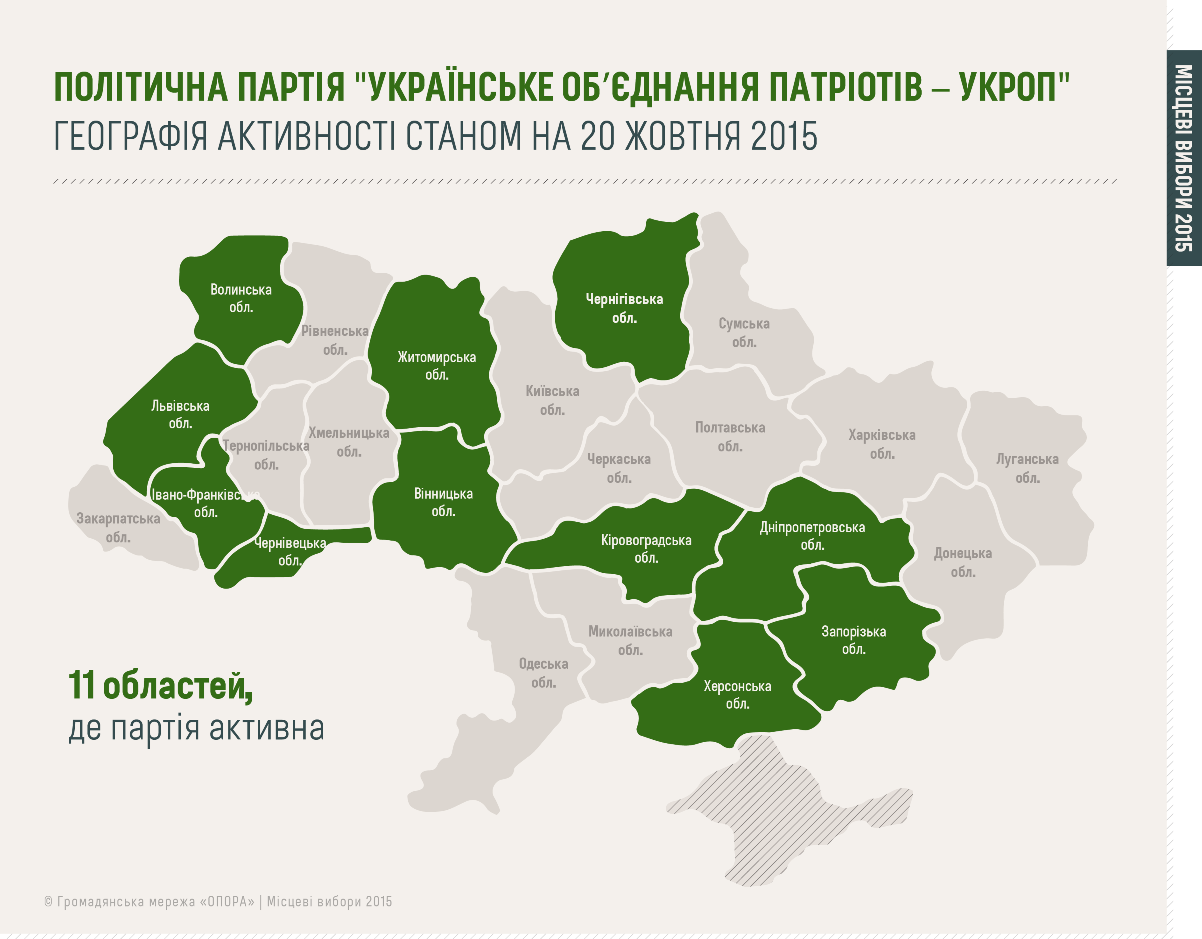
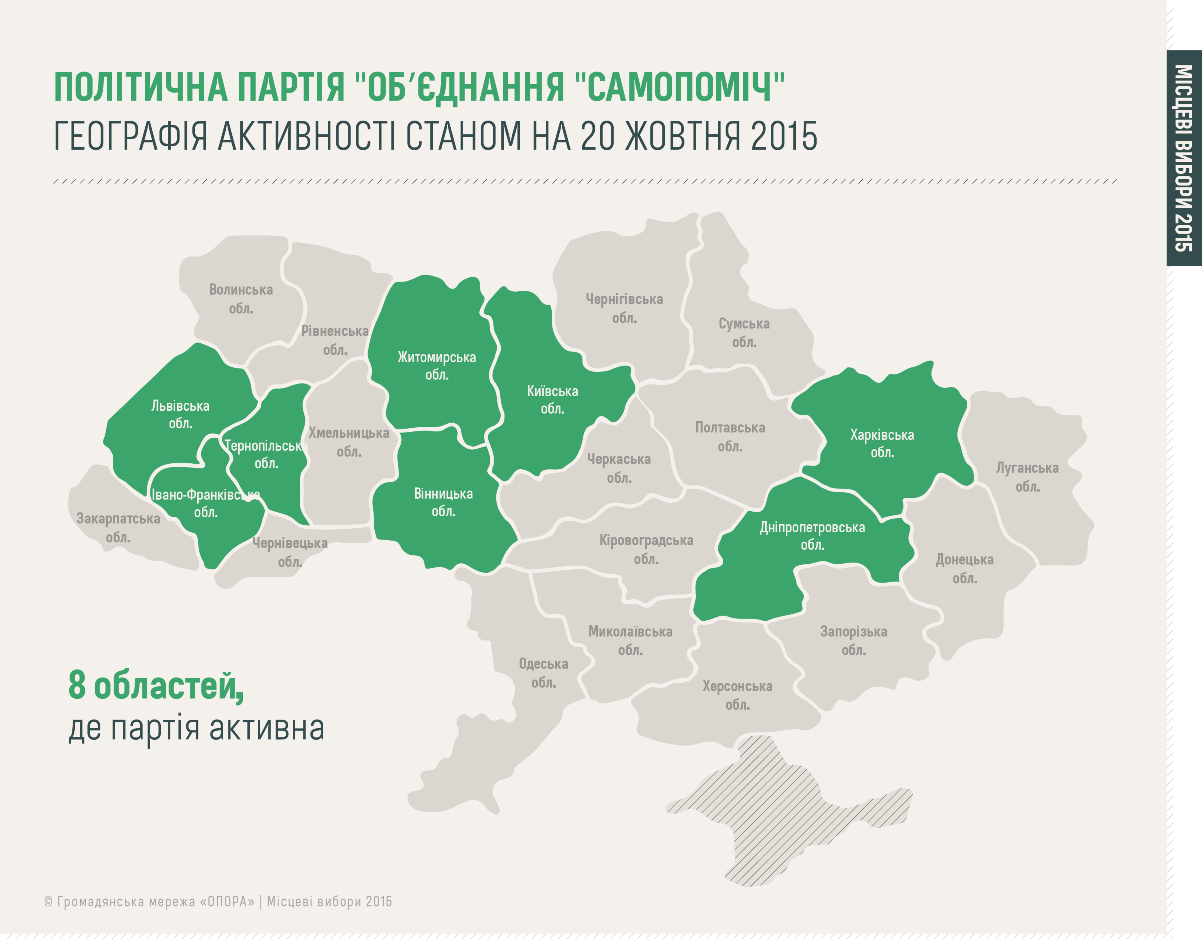
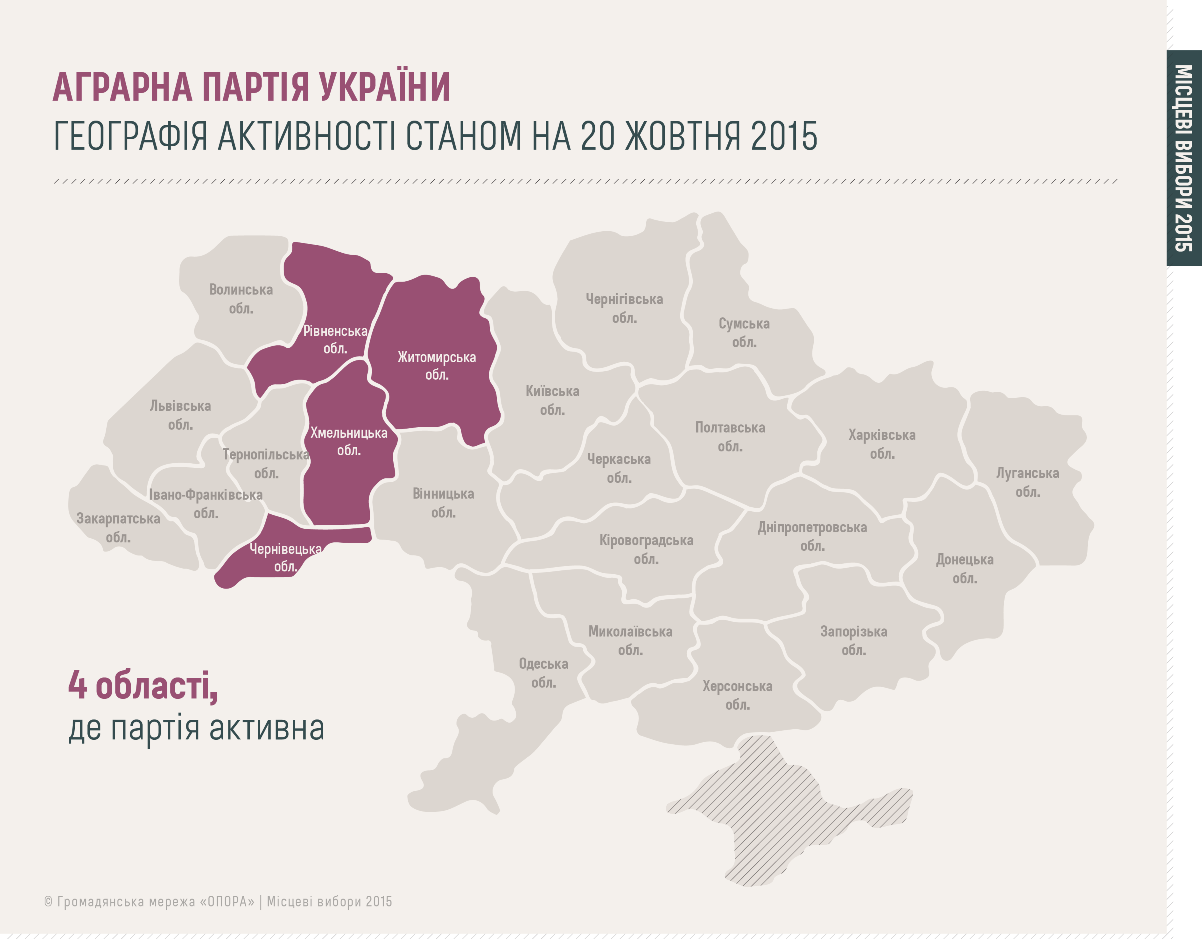
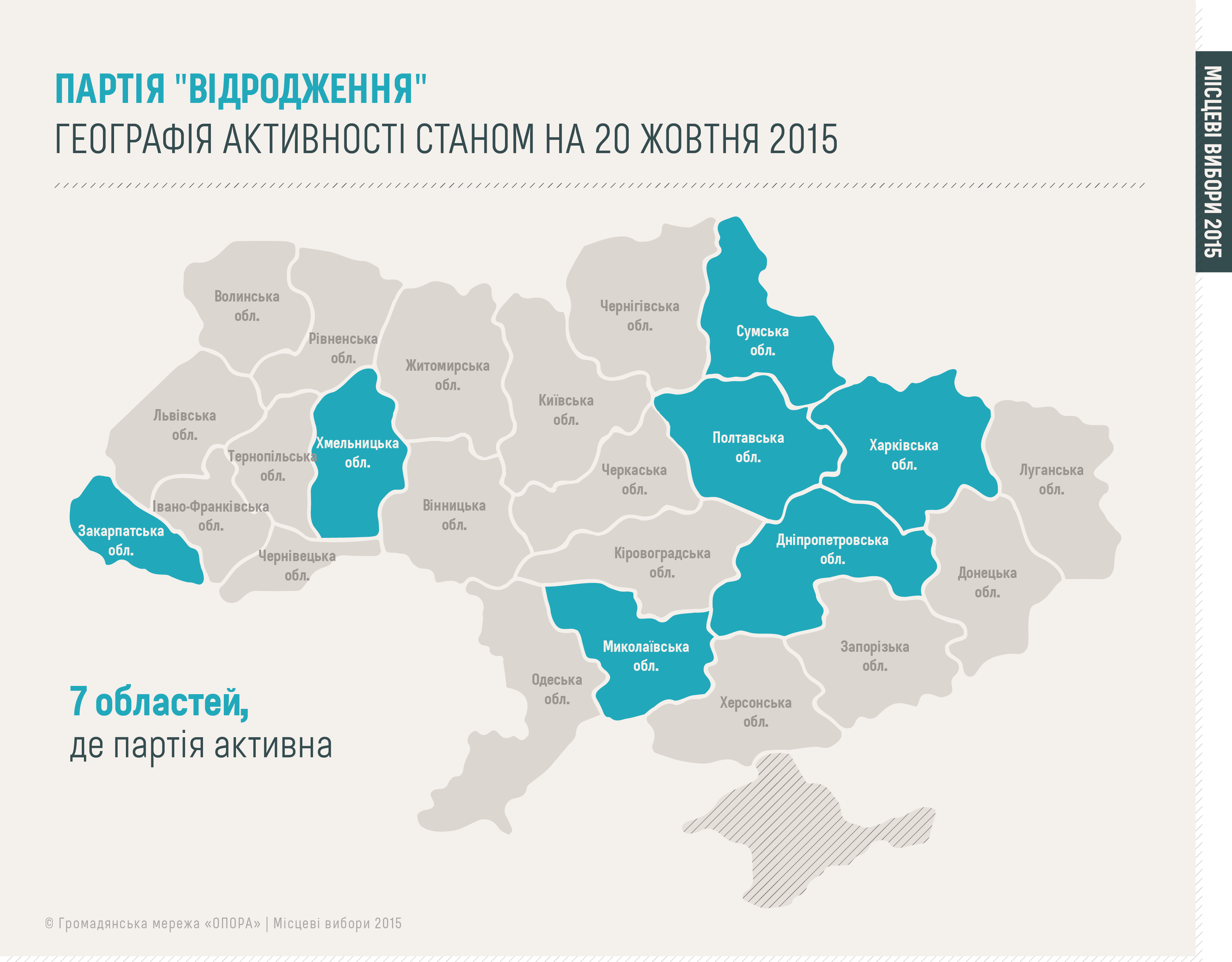
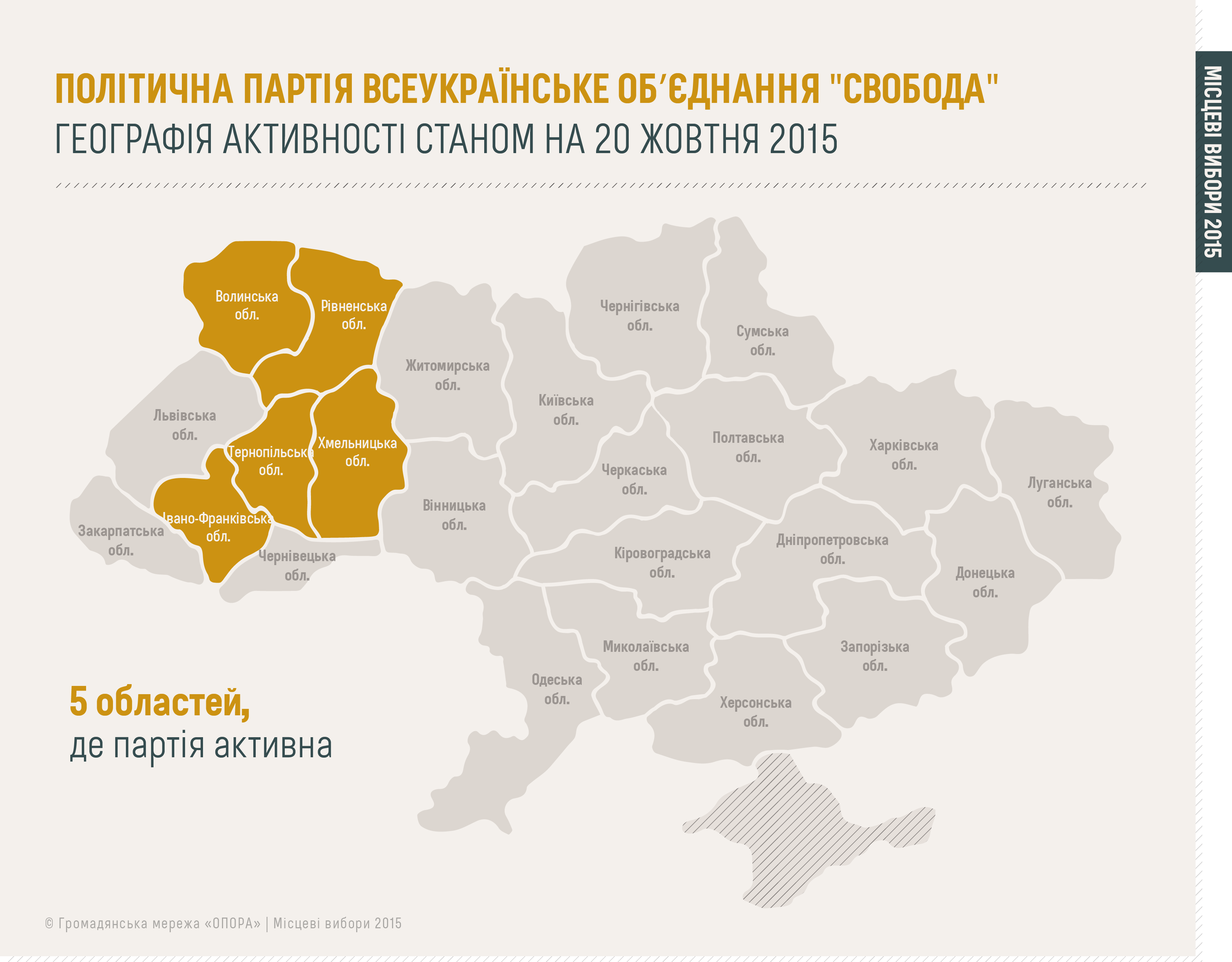
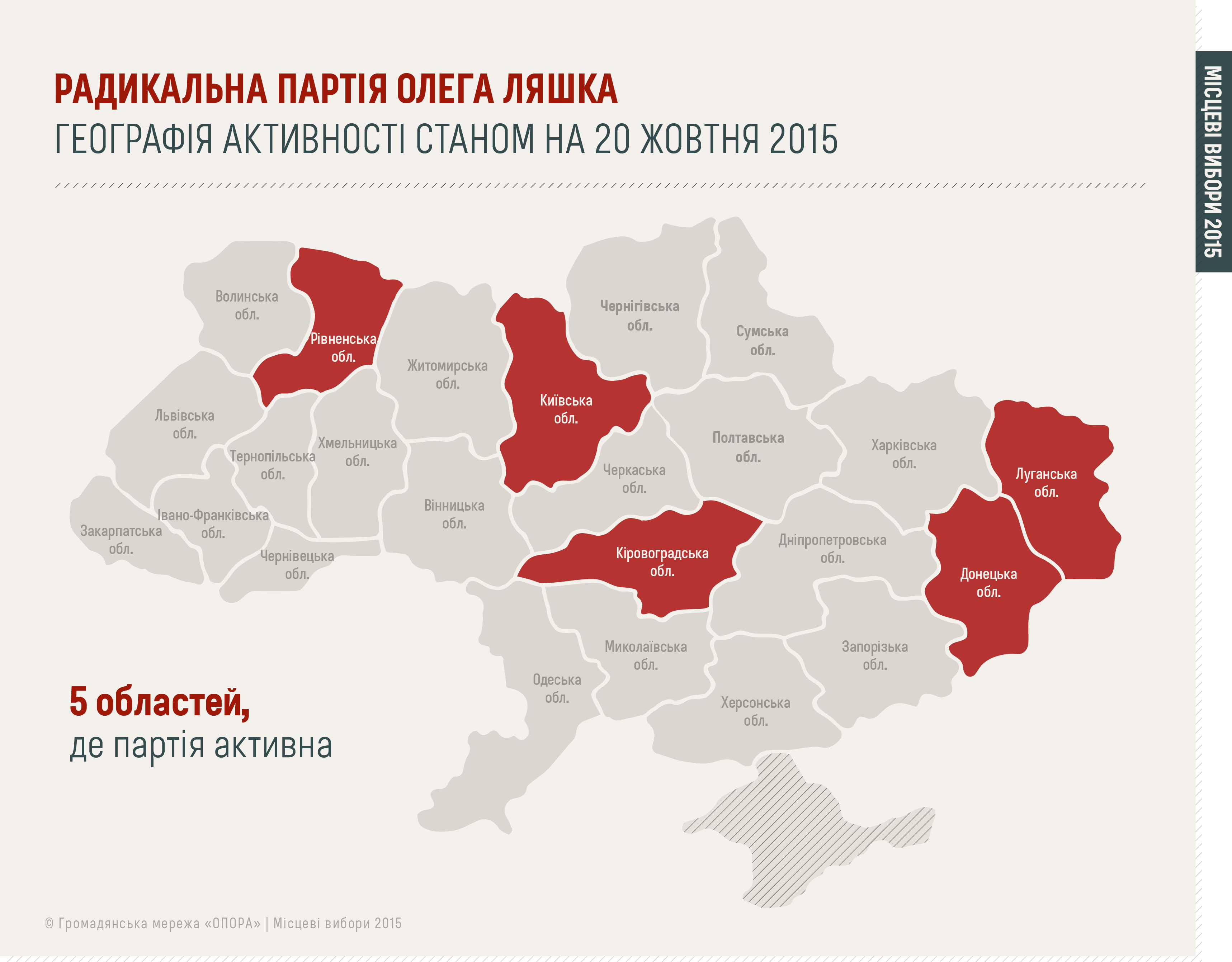
ELECTION COMMISSIONS PERFORMANCE AT LOCAL ELECTIONS
Central Election Commission Performance
Since the previous OPORA report[2], rejecting candidates’ registration (certain individuals, including M. Dobkin from the Opposition Bloc party candidate list at Kharkiv Oblast Council election) [4].
Also, CEC has approved a string of Explanatory Statements for implementing specific provisions of the Law of Ukraine on Local Elections and Procedures:
- Explanation on implementing certain provisions of the Law of Ukraine on Local Elections in regard to official observers from other states, international organizations and individuals who are accompanying them performing their duties at elections of deputies of Verkhovna Rada of the Autonomous Republic of Crimea, oblast, district, city, city district, village councils, village, town, city heads (mayors) and village and town chiefsProcedure for submitting election and other records by territorial election commissions at local elections for keeping them at local state archive institutionsProcedure for submitting updates to Central Election Commission as well as to oblast, district, city, city district, village, and town election commissions on the days of voting and re-voting at regular elections of deputies of local councils, village, town and city heads, the first election of deputies of united territorial communities and corresponding village, town and city heads on 25th October 2015[8]. At the same time, CEC rejected registration to three individuals from the Opposition Bloc candidate list due to absence of information on public work (the case of Mikhailo Dobkin), non-submission of photo-copies of the first and second passport pages as well as of the page with permanent residence address (the case of Andrii Kobzar), simultaneous nomination of the same individual by different parties’ local organizations (the case of Olga Gnezdylova). Prior to CEC’s decision on registering the candidates from the Opposition Bloc political party regional organization there was a long-lasting process of settling an election dispute that included rejection o candidate registration by Kharkiv Oblast Election Commission, appeal of this political party to CEC requesting assistance in protection of voting rights, CEC’s voiding the TEC’s decision on rejecting the registration, early termination of appointment of all the TEC members and some other actions[10].
On October 16, CEC passed the Resolution[12], Nova Vodolaga District Election Commission in Kharkiv oblast[14] and Krasnoarmiisk city election commissions in Donetsk oblast[16]. In Zhytomir oblast, all but one territorial election commissions either failed to prepare ballots on time or deliberately refused to accept them from the printing enterprises due to the lack of appropriate storing conditions. According to OPORA observers’ records, it was not until 20 October that the Skoliv District Election Commission in Lviv oblast submitted ballot printing templates to the printing enterprise.
Because of ballot text errors, in some cases there was a need to reprint ballots in order to replace those with inaccuracies.
In particular, at the Zakarpattia Oblast Council election there was an error in the ballot text. Instead of the local organization of the Smopomich Union political party the local organization of the Samopomich political party was indicated. The number of printed ballots for the Zakarpattia Oblast Council election was 958 thousand and 981 copies. However, it was only on 19.10.2015 that the inaccuracy was revealed, when the territorial election commission had received a complaint from Samopomich Union party local organization. Responding to this situation CEC, on 21.10.2015, has allocated additional subvention funds from the State Budget of Ukraine to local budgets for arranging and carrying out the election of deputies of Zakarpattia Oblast Council (949,9 thousand UAH). Under the additional funding, the new ballots for the oblast council election were printed by an enterprise located in the city of Kyiv.
Similar situation has happened at the Poltava City Council deputies election, where an error was made in the name of the city organization of Sovist Ukrainy political party (it was indicated that candidates were nominated by the oblast organization of this party). Also, the Artemivsk District Election Commission had to destroy 7594 out of 15953 ballots. In this district, Petro Poroshenko Bloc ‘Solidarity’ party was not included to the multi-member election district ballots in those territorial districts where no single-member district candidates from this party were assigned.
Hlyboka District Election Commission in Chernivetska oblast has discovered errors in the district council voting ballots. The error was made for all political parties in the ballot (it did not say there were district party organizations). By the time the error was found the ballots were in print and 80 percent out of 55 thousand were already printed. Therefore, a decision was made to destroy the ballots and print the new ones.
In some cases, ballot preparation went amidst high profile political and long-lasting judicial confrontations affecting the general level of credit given to this stage of election by both voters and election subjects. Primarily, this refers to the problems with ballot production for the Mariupol City Head and City Council elections. In that city, the territorial election commission acts amidst election subjects’ acute confrontation affecting efficiency of the election procedures.
The timeline of the confrontation related to the Mariupol City Election Commission includes: 1) CEC’s Decision of 09.10.2015 on early termination of appointment of the whole Mariupol City Election Commission in Donetsk oblast (in relation to the TEC’s decision on changing heads of Illichivsk, Prymorsk, Zhovtneva, and Ordzhonikidze Mariupol city districts’ election commissions with no legal grounds for doing so) and approving the new TEC’s members on 12.10.2015; 2) Failure to pass the decision on arrangements for producing ballots at the meetings on 13, 14, 15, and 16 of October 2015; For instance, on 15 October, the Mariupol Election Commission failed to approve an agenda for the meeting, which lasted 12 hours and where physical confrontation between the election commission members and certain candidates took place; 3) on 16 October 2015 CEC has terminated appointment of 7 TEC members because of their persistent failure to perform their duties; 4) CEC’s Decision of 16.10.2015 obliging the Mariupol City Election Commission to arrange production of voting ballots through 19 October; 5) The Mariupol City Election Commission’s Decision of 17.10.2015 on printing ballots at the printing house of the local periodical “Priazovskii Rabochii” (7 out of 11 TEC members, whose appointments were not terminated, voted for this decision, while the others thought it to be unlawful believing that it should have been passed by the majority of TEC members prior to early termination of appointment of some of them); 6) on 18.10.2015, a rally with participation of certain candidates and local party organizations took place next to the building where ballots to be printed. Rally participants claimed the TEC’s Decision on printing ballots at the printing house of the periodical “Priazovskii Rabochii” to be unlawful since it was an asset of the well-known businessman Rinat Akhmetov; 7) on 20.10.2015, in response to the legal action of the number of local organizations (Ukrainian Union of Patriots UKROP, The All Ukrainian Union Batkivschyna, Oleh Liashko Radical Party) the Donetsk District Administrative Court has recognized the Mariupol City Election Commission’s Decision of 17.10.2015 passed by 7 out of 11 TEC members as a lawful one, however, as of 21 October, the Election Commission members failed to agree upon the procedure of delivering the already printed ballots from the printing enterprise.
By contrast, on 21.10.2015 CEC passed a Decision obliging the Mariupol City Election Commission to nominate at least three of its members for receiving the ballots packed by the printing enterprise on behalf of the Commission, receive the aforementioned voting ballots and deliver them to the corresponding Mariupol city districts election commissions in accordance with the established procedure[18], the Nizhyn City Election Commission in Chernihiv oblast held a special meeting in the premises of the ballot printing enterprise responding to the fact of unauthorized access to the printing house as well as to discovery of some minor technical flaws in the ballots. Also, in the city of Nova Kakhovka in Kherson oblast candidates for city head and for deputies of the city council demanded to change the ballot printing enterprise on suspicion that the Novokakhovska City Printing House was related to the current city head and hence, there was potential threat of printing an excessive number of ballots. After lengthy debate, the City Election Commission decided to print ballots at another enterprise in the town of Velyka Lepetukha in Kherson oblast.
There was a high profile announcement from the Head Department of the MIA of Ukraine in Ternopil oblast of 21.10.2015 on finding about 1800 unaccounted for ballots as well as eight clichés for their printing[20]. This makes almost 15 percent of the total number of TEC members appointed by CEC.
Table “The parties whose local organizations have made the biggest number of TEC member rotations (from the moment of appointment through 22.10.2015)”
| Parties | Number of rotations |
| Oleh Liashko Radical Party | 276 |
| Petro Poroshenko Bloc ‘Solidarity’ party | 221 |
| The All Ukrainian Union Batkivschyna party | 213 |
| Narodnyi Front political party | 207 |
| The Opposition Bloc political party | 153 |
| Ukrainian Union of Patriots UKROP political party | 62 |
| Nash Krai political party | 54 |
| Nova Polityka political party | 50 |
| Samopomich Union political party | 41 |
| The All Ukrainian Union Svoboda political party | 34 |
| Nova Derzhava political party | 23 |
| Vidrodzhennia party | 19 |
| The Greens political party | 18 |
| The Democratic Party of Ukraine | 17 |
| The Liberal Party of Ukraine | 17 |
| Civic Position political party | 13 |
| The People’s Party | 12 |
| The political party Syla Liudei | 8 |
| The Agrarian Party of Ukraine | 8 |
| Narodna Pozycia political party | 5 |
Â
At the same time, if compared to district election commissions member rotations at the special election of Peoples’s Deputies of Verkhovna Rada of Ukraine in 2014 (50 percent was national average), current TECs membership is relatively stable. This is because parties’ local organizations endeavor to ensure high quality representation of their interests at TECs through members performing their duties on a permanent basis.
Precinct Election Commissions Performance
Precinct election commissions appointed by TECs through 9 October 2015 underwent serious member rotations over the reporting period. Poor PEC members’ motivation for performing their duties led to the need of new nominations from election subjects as well as introducing PEC members on appointment from TECs. After primary DEC member appointments it was common to find that parties’ local organizations nominated registered candidates, individuals who had no voting right at a respective election or other inappropriate persons.
For instance, as of 20.10.2015, in Pechenihy district of Kharkiv oblast 25 percent of total DEC members were replaced. Approximately one third of DEC members were replaced in the districts of Kherson oblast, although in this case election process subjects were swiftly proposing new candidates for appointment by TECs. In Odesa oblast, most rotations happen in the oblast center (over 20 percent of total members in respective commissions) while lower intensity rotations are registered in the region’s districts. Also in this region, OPORA observers note failures to meet requirements on logistical support of most DECs. There is a rather difficult situation in the city of Berdiansk in Zaporizzhia oblast, where, as of 19.10.2015, nearly 60 percent of DEC members were replaced.
Despite there were no mass-scale disruptions in DEC’s work, most of these election commissions are operating in their minimal lineup which poses a risk of organizational problems on the voting day.
OPORA observers note low voters’ activity in regard to getting familiar with preliminary voter lists and a small number of applications to DECs on making corrections to the preliminary voter lists. This is mainly due to the fact that the previous election (the special election of People’s Deputies of Ukraine) went only a year ago and therefore inaccuracies in voter lists are rare.
As a rule, DECs have failed to fully meet the deadline for mailing or delivering in another way personal voting invitations (through 14 October). At the same time, the requirement of the Law on delivering personal invitations to voters was generally fulfilled.
OPORA observers have registered occasional facts telling of legislation violations on the part of DECs or their members. For instance, a case, where a number of DEC members were participating in election campaigning, was registered in the village of Serbychany in Sokyryntsi district of Chernivtsi oblast.
VIOLATIONS OF ELECTION LEGISLATION
As of the end of October, observers from Civic Network OPORA have registered over 668 various violations of election legislation committed by all of the most active candidates and parties who are election subjects.
More than a half of all violations had to do with noncompliance of parties and candidates with the rules of campaigning as well as with clear restrictions set by the Law on Local Elections. (Articles 54 to 60). OPORA observers have registered 395 instances of illegal campaigning. The lion’s share of those had to do with producing and distributing campaigning materials at the expense of funds other than those from the election fund. Candidates and parties distribute, on a massive scale, campaigning materials with no imprint on ordering customer, printing institution, number of copies printed, or names of those responsible for printing. In practice, this tells of significant costs borne by parties and candidates that they avoid to report and open for control thus acquiring non-competitive advantages during the campaign.
Other widespread violations such as displaying campaigning materials at inappropriate locations or those restricted by the Law, namely on architectural landmarks, in public transport, in the premises of state authorities and local government, at bus and railway stations and in airports. Observers have registered 124 such instances in all regions of Ukraine.
Increasingly frequent instances of dirty campaigning and black PR (35 registered incidents) indicate a growing level of unfair competition among candidates and an increasing role of technical aspect to the election process. Mass media also take part in violations committed by parties and candidates by not following campaign rules, namely, by not marking political advertisements and failing to ensure equal and unbiased attitude toward all parties and candidates. OPORA observers have registered 25 such cases.
The second most frequent type of violating election legislation was indirect voter bribery. OPORA has identified almost two hundred such cases on the part of all parties. A characteristic feature of this type of violations is that they are non-systemic and, mostly, appear to be personal initiatives of candidates for deputies or city heads from various political parties. Most of these violations are of a typical character.
Residential site improvement, road repairs, children playground installation, distributing food parcels and presents as well as providing free medical and legal services remain major forms of indirect voter bribery.
Far more rarely (38 incidents), OPORA observers register violations on the part of election commissions, which, for the most part, result from professional and legislative incompetence of election commission members at various levels. This shows, in particular, through election records manipulations.
There were no significant instances of direct criminal interference in the election process, except for various cases of property and campaigning materials damage as well as several incidents of using violence and threats (23 instances altogether).
In spite of the apparent motivation and significant potential of the pro-government parties and candidates to use administrative resources, those violations were neither widespread nor systemic (there were registered two scores of such incidents). Most frequently, it was local government officials who employed various forms of administrative resource abuse.
Instances of Illegal Campaigning
In the city of Kharkiv, on 18 October, OPORA official observers registered a billboard with political advertisement of a candidate for mayor Oleksandr Davtian (PETRO POROSHENKO BLOC ‘SOLIDARITY’) on the front wall of Kharkiv-Pasazhyrskyi railway station (1, Pryvokzalna sq.). At the spot, OPORA observers have called the police. A report and an explanation statement were filed along with the Act registering the violation of the Law of Ukraine on Local Elections. In the city of Pervomaiske, in Kharkiv oblast, on 17 October, OPORA official observers registered numerous posters of the Nash Krai party containing no imprint information. The placards were located at 16 and 23 Lenin st. Also, campaigning materials of the same party were posted at inappropriate places, particularly on power poles.
Numerous printed campaigning materials with Petro Poroshenko Bloc ‘Solidarity’ symbols were discovered at the wall of the bus station building in the town of Verkhovyna in Ivano-Frankivsk oblast. An observer reported this fact to the police. Similarly, in Kherson oblast Petro Poroshenko Bloc ‘Solidarity’ extensively uses bus stations in rural areas for placing their campaigning materials. Campaigning materials were placed at the bus stations in the city of Nova Kakhovka (6 October) and the town of Hornostaivka (16 october). After making a complaint and reporting to the police the advertisements were removed.
Advertisements of Petro Poroshenko Bloc ‘Solidarity’ party and of the candidate for city head from the same party Natalia Yakymchuk were found in the premises of Central Bus Station in the city of Chernivtsi at 219, Holovna St. The advertisements were displayed on the information board of the payment kiosk along with other commercial advertisements. The police was called and complaint filed. As OPORA have learned afterwards, after the police interfered the advertisements were removed.
One may treat campaigning events of the candidate for Odesa City Head Svitlana Fabrykant (Vidrodhennia party) featuring Belarusian band Pisniary as campaigning by foreign citizens. The concerts took place in every district of the city between 15-18 October (4 districts in total).
Instances of Voter Bribery
In the city of Chernivtsi, campaigners, on behalf of the candidates for deputies of Chernivtsi City Council from Ridne Misto party (Tetiana Beshlei, Volodymyr Beshlei, Anatolii Chesanov, Vasyl Dutchak, and Maryna Haievska), give voters personally addressed so-called ‘social travel cards’ for a would be free travel on public transport. A plastic ‘social travel card’ is enclosed within campaigning materials in favor of the candidate for Chernivtsi City Head from that party Vitalii Mykhailishyn. A leaflet containing a voter’s name says that the travel card will become valid starting 1 December 2015 when that very candidate is elected mayor. In the brochure titled “Together We Restore Justice” Vitalii Mykhailishyn personally addresses voters explaining that this card will enable free travel on public transport. He reminds that such travel cards were available through the whole term of his previous office as a city head (Vitalii Mykhailysyn acted as mayor between 2011-2014). Also, it says that if that person votes for Ridne Misto at the election on 25 October, he or she would “restore justice” by re-introducing social cards that will become valid starting 1 December. Considering that so-called ‘social cards’ in brochures contain voters’ full names and they are delivered to the door, the question arises about the bank of personal data available to campaigners. In regard to personal data available to candidates and their campaign teams, OPORA has contacted the Regional Office of the MIA of Ukraine in Chernivtsi oblast requesting to verify whether such candidates’ activities comply with the Law on Personal Data Protection. Observers remark that free travel cards are an election advertisement offering a concrete material benefit in the future. If these were actually valid travel cards their distribution could be treated as voter bribery.
OPORA observers reported that in the Dormitory No2 of I.Fedkovych National University of Chernivtsi students were offered 350 UAH per vote for Vitalii Mykhailishyn.
In the city of Ivano-Frankivsk, 17 October, free WiFi access to the Internet was launched at the expense of the Charity Fund Novyi Ivano-Frankivsk and the city organization of Ukrainian Union of Patriots – UKROP. This fact was reported to the Regional Office of the MIA.
18 October, in the city of Krasnohrad in Kharkiv oblast, at a square next to the bus station at 91, Poltavska st, an OPORA observer discovered campaigning on behalf of the Vidrodzhennia party by selling goods at preferential prices, namely, potatoes and carrots for 1 UAH per kilogram, which can be qualified as voter bribery.
In the city of Kherson, 12-18 October, in the yards in several residential neighborhoods leaflets were distributed saying “Road repairs are starting in your yard. Please do not block the way. Nash Krai. (and the candidate’s name)”.
In the city of Bila Tserkva (Kyiv oblast), at Instytutska and Ac.Vula st., campaigners were giving away 100 UAH per person on behalf of the candidate from Oleh Liashko Radical Party Oleksandr Poliarush. The incident was reviewed by the court and perpetrators were held accountable.
In the city of Kyiv, on 17 October, at about 5 pm, between two residential buildings at 6-7, Schuseva St., representatives of the candidate for deputy of the Kyiv City Council from Iednist political party Oleksandr Brodskyi (election district No 117) arranged dairy products sale at reduced prices. A liter of milk cost 9 UAH, a kilogram of cheese – 30 UAH, a half-liter of cream – 22 UAH. During the improvised fair, campaigners communicated with citizens, while a salesperson packed purchases into the branded bags with the inscription “Oleksandr Brodskyi”. Witnessing the fact of election legislation violation, an observer from Civic Network OPORA called for a crime scene investigation group of the Shevchenkivskyi District Office of the Main Department of the MIA of Ukraine in the city of Kyiv. The police drew up the protocol, questioned witnesses and withdrew Oleksandr Brodskyi’s campaigning materials.
Another fact of indirect voter bribery was registered 18 October in Shevchenkivskyi district of the city of Kyiv. A candidate for deputy from the Opposition Bloc Oleh Voloshyn (election district No 114) offered voters a free ride to the Vydubychi Monastery. The buses were departing at 2 pm from several locations. First voters were taken to Ivan Kotliarevskyi Park, where the candidate gave a speech and a public prayer was held, and then they were taken to the Vydubychi Monastery, where in addition to the walk and excursion medovuha (traditional honey-based vodka), juice, sandwiches and sweets were served.
On 12 October, a candidate for deputy of the Rivne Oblast Council Volodymyr Kovalchuk from Oleh Liashko Radical Party (nominated in the city of Zdolbuniv) organized a trip to Kyiv for Zdolbuniv citizens to attend the Ukraine vs. Spain football match. Two buses were arranged for fans, a part of whom were ATO veterans from Zdolbuniv. A tickets for the game cost 300 UAH.
On 17 October, in the city of Vinnytsia, Civic network OPORA received a phone-call from inhabitants of Sverdlova and Stakhurskogo streets reporting the fact of voter bribery. As OPORA representatives have later discovered, at 41, R.Skaleckoho st., in the People’s Deputy of Ukraine Hennadii Tkachuk’s reception room financial assistance of 150 UAH was being given away. People reported they were asked to vote for the candidate for deputy of the city council Ihor Tkachuk (People’s Deputy Hennadii Tkachuk’s brother). They also said that the money came from the People’s Deputy’s fund.
In Volyn oblast, the most characteristic instances of voter bribery were those of using Novyi Lutsk Fund by Oleksandr Tovsteniuk and Ihor Palytsia throughout the campaign. In particular, those instances included free performances for certain categories of citizens, giving away free certificates for medications and food, arranging free stays at spa-resorts for veterans and Olympiad winners, installation and improvement of children playgrounds and sports grounds at schools, arranging various concerts, during which presents were given away. On 15 October, in Kolky Technical High School on behalf of I.Palytsia’s Charity Fund Novi Lutsk parents of district Olympiads winning students were presented free vouchers for a 5 day stay at Bukovel Artec between 26.10.2015 and 01.11.2015 for their children. Along with the voucher there came a rain-coat, a note-pad, a pen and a plastic bag with the Fund logo. On 16 October, veterans departed from the city of Lutsk, on behalf of the Charity Fund Novyi Lutsk, for a free rehabilitation program.
In Zhytomir oblast, employees of DP Chudnivska Filia Zhytomyrskii Likero-Horilchanyi Zavod (Chudniv distillery) performed repair works on central heating systems in Didkivci village kindergarten, Chudniv Specialized School, and Didkivci Comprehensive School of I-III levels. This was extensively advertised in the local media. The director of the distillery, Vladyslav Lavrukhin, is a candidate for deputy of the oblast council from Petro Poroshenko Bloc ‘Solidarity’. Also, on 14 October, the same candidate arranged a free excursion for students of Chudniv Comprehensive School No2 as well as Tiutiunnyky and Korochenci schools to museums at the city of Kyiv.
In the City Cultural Center of Novohrad Volynskyi on the occasion of Pokrova holiday at 3 pm there took place a concert of the Party of Pensioners of Ukraine. Food parcels being given away to pensioners was registered towards the concert’s end.
Instances of Administrative Resource Abuse
In the city of Odesa, Trust in Deeds party continues to use the Municipal Targeted Program on Providing Social Services and Other Forms of Assistance to Vulnerable Population as well as Municipal Targeted Program on Support of Veterans of War, Families of Dead Servicemen and Children of War of the City of Odesa for out-of-door campaigning and at meetings with voters. For instance, during the fair arranged on behalf of the candidate for deputy of the city council from Trust in Deeds party that took place on 14 October pensioners were given social bread cards providing a discount for bakery products. ‘Odesa Citizen Social Card’ is one of the measures in the framework of the Municipal Targeted Program on Providing Social Services and Other Forms of Assistance to Vulnerable Population.
Also in the city of Odesa, the current mayor, who is also a candidate for city head, as well as a candidate for deputy of the City Council Liudmila Varavva (Trust in Deeds party) have participated in the official opening of Desant Boulevard renovated at the expense of the city budget. The event was marked by extensive use of the party symbols and campaigning by the current mayor in favor of the candidate Liudmila Varavva.
On 8 October, the official opening of Zhovten Film Theater, which suffered from the fire last year, took place at 26, Kostiantynivska st. in the city of Kyiv. In the vicinity of the theater and on the very building placards were placed advertising Zhovten’s opening date as well as slogans of Petro Poroshenko Bloc ‘Solidarity’: “We will open ‘Zhovten’ (‘October’) on 18 October. We change our city by real deeds. Vitalii Klitchko.” Near the theater entrance there was placed a large screen displaying political advertisements of Petro Poroshenko Bloc ‘Solidarity’ party, whose leader Vitalii Klitchko is also a candidate for City Head. Moreover, visitors were constantly reminded of the number, under which the mayor’s party was to be listed on the ballot.
Head of Lviv Oblast State Administration, having taken a vacation, is visiting the oblast districts campaigning for ‘Solidarity’ party. However, some reports say he is making official visits as a head of oblast state administration. For instance, in the cities of Horodok and Iavoriv, employees of education and culture institutions (schools, kindergartens, public houses etc.) were gathered for meeting with the Head of Lviv Oblast State Administration Oleh Syniutka during his visit, which was not announced.
In the city of Chernivtsi, on 19 October, in the Building No 14 of I.Fedkovych National University of Chernivtsi there took place a meeting of representatives and candidates from Vidrodzhennia party with students who were taken off their classes to participate in the event. The meeting was organized and moderated by Natalia Strelchuk, a candidate for City Head from Vidrodzhennia party. Viktor Bondar, a People’s Deputy of Verkhovna Rada of Ukraine gave a speech. He was announced by Oleh Unhurian, Head of Vidrodzhennia Chernivtsi Oblast Organization. The People’s Deputy has several times stressed he had not come to campaign, although, in fact, participants spoke of the election and Vidrodzhennia party candidates.
In Cherkasy oblast, the current mayor of the city of Vatutino holds meetings with voters during his business hours, for instance, on 15 October at the City Polyclinic at 8 am, on 19 October at the brickyard at 9 am, and on 20 October with the School No5 staff at 10 am (delayed).
In Chernihiv oblast, on 12 October, at the kindergarten in the city of Mena, there took place a meeting of the institution’s staff with the current mayor Fedor Fesiun and current deputy and a candidate for deputies of the district council Volodymyr Pryschepa, who tops Nash Krai party candidate list. At the same time, Sosnytsia district news-paper Visti Sosnycchyny (of 10.10.2015) reports that in Avdiivka Comprehensive School a high quality medical examination was arranged for children by personnel from Chernihiv Oblast Children’s Hospital. Deputy of the oblast council Oleksandr Kareta and Head of Sosnytsia District State Administration Oleksandr Ocheredko (both nominated by the party Petro Poroshenko Bloc ‘Solidarity’) came to monitor the event. When examination was over, there took place a meeting of parents and school staff with the guests. There continues to be a practice of distributing the City Council official news-paper Chernihivski Visti supporting the current mayor Oleksandr Sokolov at campaigning tents Nash Krai party.
[12] In regard to the court decision on voiding the rejection of registration to candidates for deputies of the oblast council nominated by the Vidrodzhennia party
[14] In regard to the judicial appeal on the TEC’s decision on registration of representative from the AUU Batkivschyna local organization as a candidate for city head from Nash Krai party.
[16] The deadlines set for TECs in cities of district subordinance, villages and towns were met.
[18] In Chernihiv oblast, on 15.10.2015 at 6 pm, the candidates from Oleh Liashko Radical Party and Samopomich illegally entered the printing house where the ballots were being printed. After doing so, representatives from these political parties announced in media that unauthorized people can enter the printing house and carry voting ballots away. They also remarked inaccuracies in the ballot text. Â
[20] Oblast, district, city (cities of oblast subordinance and the city of Kyiv) Kyiv city districts election commissions.Â